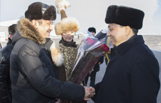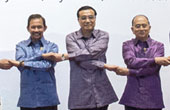Israel vows harsh response to synagogue attack
(Agencies) Updated: 2014-11-19 09:56It described the four as "rabbis," an honorific title in the ultra-Orthodox world given to men who are considered pious and learned. Twersky, a native of Boston, was the head of the Toras Moshe Yeshiva, a seminary for English-speaking students. He was the son of Rabbi Isador Twersky, founder of Harvard University's Center for Jewish Studies, and a grandson Rabbi Joseph B. Soloveitchik, a luminary in the world of modern Orthodox Jewry.
Thousands of people attended a joint funeral for Kupinsky, Levine and Goldberg before sundown_ held outside the synagogue where they were killed.
In recent weeks, Jerusalem has seen its worst sustained bout of violence since a Palestinian uprising a decade ago. Palestinian assailants have carried out a pair of deadly attacks by ramming their cars into crowded train stations, while a gunman shot and seriously wounded a Jewish activist who has campaigned for greater access to the holy site.
The hilltop compound, in Jerusalem's Old City, has been at the heart of the tensions. It is revered by Jews as the Temple Mount, the site of the ancient Hebrew temples. For Muslims, it is the Noble Sanctuary, home to the Al-Aqsa Mosque and the iconic gold-topped Dome of the Rock.
Under a longstanding arrangement, Jews are permitted to visit but not to pray. A growing number of visits by Jewish worshippers, many who seek the right to pray there, has drawn Muslim accusations that Israel is secretly trying to take over the site and sparked violent clashes between young Palestinians and Israeli police.
Netanyahu has repeatedly said he will not change that arrangement, but the violence has spread beyond Jerusalem, with deadly stabbings in Tel Aviv and the West Bank last week, while the fatal shooting of a young Arab protester in northern Israel by police _ apparently as he was walking away from an officer _ has added to the tensions.
Late Tuesday, several hundred Jewish youths marched through downtown Jerusalem, blocking traffic and chanting, "Death to Arabs." Police reported at least 10 arrests.
Police identified the synagogue attackers as Ghassan and Oday Abu Jamal, cousins from the Jabal Mukaber neighborhood in east Jerusalem.
Police spokesman Micky Rosenfeld said the assailants were killed in a shootout with police that left one officer critically wounded. He said police were still trying to determine how the men had chosen their target.
Mohammed Zahaikeh, a social activist in Jabal Mukaber, said he did not know whether the cousins were politically active. He said Ghassan was 27, married with two young children and worked in a clothing store. Oday, 21, was not married and was an interior decorator. He said both men were quiet, and residents were surprised by the attack.
Clashes later broke out outside the assailants' home, where dozens of police officers had converged. Residents hurled stones at police, who responded with tear gas and stun grenades. Residents said 14 members of the Abu Jamal family were arrested.
The violence has created a special security challenge for Israel. Where Palestinian violence has traditionally been carried out by organized militant groups based in the West Bank or Gaza, most of the recent attacks have been done by perpetrators from east Jerusalem acting on their own.
Related stories:
- 4 reported dead in terror attack at Jerusalem synagogue
- US hits out over Jewish homes for E. Jerusalem
- Tension in East Jerusalem soars in holy site dispute
- Jordan recalls envoy to Israel over Jerusalem 'violations'
- Hamas claims responsibility for drive-over car attack in Jerusalem
- East Jerusalem tensions build on housing plan










